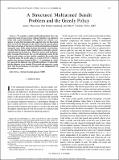A Structured Multiarmed Bandit Problem and the Greedy Policy
Author(s)
Rusmevichientong, Paat; Mersereau, Adam J.; Tsitsiklis, John N.
DownloadMersereau-2009-A Structured Multiar.pdf (839.8Kb)
PUBLISHER_POLICY
Publisher Policy
Article is made available in accordance with the publisher's policy and may be subject to US copyright law. Please refer to the publisher's site for terms of use.
Terms of use
Metadata
Show full item recordAbstract
We consider a multiarmed bandit problem where the expected reward of each arm is a linear function of an unknown scalar with a prior distribution. The objective is to choose a sequence of arms that maximizes the expected total (or discounted total) reward. We demonstrate the effectiveness of a greedy policy that takes advantage of the known statistical correlation structure among the arms. In the infinite horizon discounted reward setting, we show that the greedy and optimal policies eventually coincide, and both settle on the best arm. This is in contrast with the Incomplete Learning Theorem for the case of independent arms. In the total reward setting, we show that the cumulative Bayes risk after T periods under the greedy policy is at most O(logT), which is smaller than the lower bound of Omega(log[superscript 2] T) established by Lai for a general, but different, class of bandit problems. We also establish the tightness of our bounds. Theoretical and numerical results show that the performance of our policy scales independently of the number of arms.
Date issued
2009-12Department
Massachusetts Institute of Technology. Department of Electrical Engineering and Computer Science; Massachusetts Institute of Technology. Laboratory for Information and Decision SystemsJournal
IEEE Transactions on Automatic Control
Publisher
Institute of Electrical and Electronics Engineers
Citation
Mersereau, A.J., P. Rusmevichientong, and J.N. Tsitsiklis. “A Structured Multiarmed Bandit Problem and the Greedy Policy.” Automatic Control, IEEE Transactions on 54.12 (2009): 2787-2802. © 2009 Institute of Electrical and Electronics Engineers.
Version: Final published version
ISSN
0018-9286
Keywords
Markov decision process (MDP)